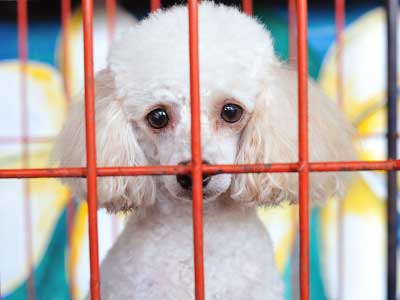Please Share This Article With Your Friends
We talk quite a lot about separation anxiety a lot in our post – Is Home Dog Boarding The Perfect Alternative To Kennels, and when you are faced with it, things can get pretty bad.
Separation anxiety is exactly what it sounds – your dog gets anxious when they are separated from you, and when a dog is anxious, it doesn’t exactly act as though it normally would. In fact, around fifteen percent of all behavioural problems in dogs is said to arise as a result of separation anxiety.
Poor pooches!
Dogs will often display rather odd behavioural patterns when they are anxious about being away from you. They might start drooling uncontrollably. They might bark & howl a lot, normally because they are calling for you to come back. They might damage your house by scratching down doors, chewing through furnishings, or even being sick and going to the toilet all over your house. It’s not their fault – separation anxiety is something that some dogs just can’t help.
So why do some dogs get separation anxiety, while others don’t?
Although there is no real, genuine scientific answer behind why certain pups get this nasty condition, it is said to be believed (thus far) that dogs that start their lives in rescue shelters often develop the problem more commonly. This makes sense when you think about it – the pup was abandoned or even started their life in a big cage in a shelter, being stared at and passed by, by ‘strange looking’ humans. When they finally get lucky enough to be re-homed, they are probably terrified about being abandoned again, even if you are just leaving them to pop to the shops. The rescue shelters do a great job, but no dog would want to end up back there so it isn’t surprising that some dogs get worried and anxious when you leave them.
Some pooches develop separation anxiety because of a disruption in their lives. It could be the change of house, home, family, partner, and more. It could even be because of the introduction of a new baby or a new pet. In fact, things as simple as a change to the time that you would normally walk your pet can create a downward spiral. Change is not so good for your furry little friends, it would seem, they like routine so it is your job to make them feel secure again if there is a change to that routine.
Separation anxiety can happen to any breed of dog, of any age, in any household, in any place in the world. If you get your dog from a rescue home, then yes there might be a slightly higher chance that they will develop separation anxiety at some point during their lives, but even happy one owner dogs can suffer with this from time to time so don’t let this put you off considering adopting a puppy or dog from a rescue shelter (they make the best dogs in our eyes, but we are biased!) It could be a sign of your lack of leadership as an owner, or even because of a lack of exercise, and in most common cases, it could just be because you have been to work all day and left them on their own for too long.
Nobody likes to be on their own for long periods of time, do they?
At the end of the day, separation anxiety mainly comes down to your dog not feeling safe & secure in their own environment. Even if you love your dog to death and feel that you are treating them like a king, try to ensure that your dog knows it’s position in your pack and they should start to feel more secure. If you create proper boundaries, give them lots of exercise & discipline, and of course, lots of love and affection, then you are doing all you can to prevent separation anxiety from occurring.
If you feel that your dog isn’t getting enough exercise during the day, or that he/she is being left on their own for too long, then feel free to get in touch to see if we can help.
Also, please read our blog on Feliway For Calm Cats & Dap (Adaptil) For Calm Dogs as these calming products could help.
Please Share This Article With Your Friends
Image courtesy of Sommai / FreeDigitalPhotos.net

